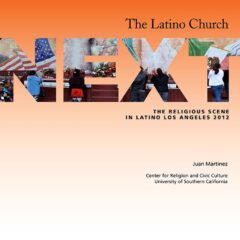Because of their unique history and location, Latinos have the opportunity to make a significant impact on religious life in Los Angeles today. Their spiritual vibrancy is contributing to the growth of many parishes and churches in the city and county. But they also bring a unique perspective that can contribute to Christian faith and practice so that it can respond to the challenges of a post-Christian world. Locally, Latino Christians are helping churches and parishes in transitional neighborhoods by working alongside the existing majority congregations that are struggling, even as they develop new Latino sister congregations.
The religious commitment in the Latina community can provide the basis for new spiritual vitality that can have a positive impact in faith communities and throughout the city. Los Angeles constantly reinvents itself to “wash away” its past. The growing Latina Christian presence may be an opportunity for the city to make peace with its past. Angelinos as a whole need to develop a “non-innocent” reading of Los Angeles so that they can address the painful aspects of its history. Because most Latinos know that history is never innocent, either because of their experiences in Latin America or because of their lives in Los Angeles, they can be helpful in the process of truth-telling about the past. This would be a crucial part of a reconciliation process among all the communities who call Los Angeles home.
The transnational experiences of Latina Christians can help other Christians in the city connect to the church outside of the U.S. The church is vibrant and growing in Latin America. Many churches in Los Angeles need to connect to the embodied spirituality lived by Latinos, but also with a truly global church. The vibrancy of the church in the majority world can help churches in Los Angeles find spiritual renewal. Latinos can serve as key facilitators in that process. Because Latinos are mestizos—a combination of peoples from many countries in Latin America—they can also model a new way to construct interethnic relations in the city. Most Latino churches are already multicultural and multi-ethnic. Many of these congregations also already have working relationships with majority culture congregations as part of multi-congregational churches or because they share church buildings. Latinos already live an increasingly multicultural reality. Because of that they model some of the ways Angelenos can move forward in this diverse city.
Where might we be going?
Defining the future As Latinos seek to define the future, the temptation will be to assume that “my” experience is the definitive experience. Those who have taken the path of structural assimilation can easily assume that all Latinos will “eventually” look like them and seek to have ministry decisions shaped accordingly. Those who have fought hard to maintain Latino religious structures may be tempted to assume that all Latinos should care about what they have accomplished and continue to support them.
Yet if current and historical trends are any indication, the Latina community will continue to diversify. A significant percentage of Latinas will marry outside of the ethnic community, though this will not always mean that the person will be structurally assimilating; some will bring their spouses into the Latino community. Because of the likelihood of increasing labor needs as baby boomers retire, it is extremely probable that there will also continue to be new temporary as well as permanent migrants from Latin America. All of this movement will enrich and further diversify the people who are grouped under the “Latina” umbrella.
Current majority culture religious structures will continue into the foreseeable future, and many in Los Angeles will continue to see them as representative of the state of Christianity in the city. But even as many become shells of their former selves, new churches and movements will continue to give spiritual vitality to Christian faith. While some churches reflect the increasing secularization of our society, and others lament it, Latino churches will likely be key players in a spiritual renewal in the city, alongside other minority churches. A key question yet unanswered is whether Christian faith will be the engine for reconciliation and new relationships between the various minority communities in the city. There are deep hurts, and there are many who prefer that Latinos and AfricanAmericans continue to work at cross-purposes. But both communities confess a common faith and assert the importance of that faith to how they live in the city. Might the small efforts at Black-Brown conversations among pastors from both communities be the beginning of a significant change in how these communities relate to each other?
Los Angeles began as a Latin American town, and in many ways it is a Latin American city today. It is also a key crossroads of the Pacific Rim. If the city can draw from its Latinoness it will have tools to envision a new, more intentionally multicultural, multi-ethnic and multilingual future. The relationship between Latino and Euro American Christians has a tortured history in Los Angeles, and it is likely that there will still be a lot of pain before a good new model of working together completely emerges. Latinos have gone through many negative experiences, and many might be unsure about the value of working toward a joint future. Mañana might always feel like it is another step away. Yet believing in mañana is to believe that God continues to work.
Juan Martinez is a former fellow with the USC Center for Religion and Civic Culture.

